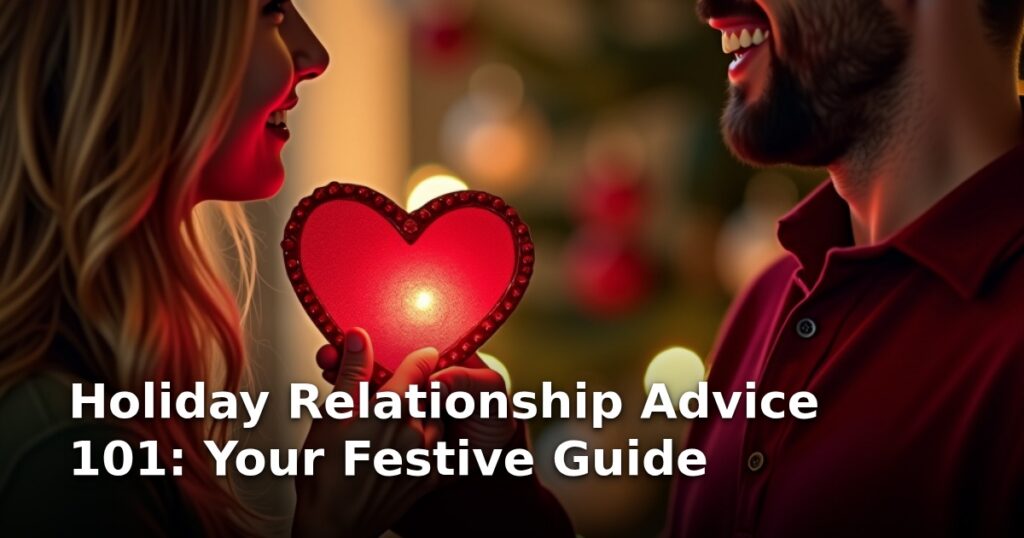Holiday Relationship Advice 101: Your Festive Guide
The holiday season, often depicted in movies as a time of perfect harmony, can sometimes feel more like a high-pressure juggling act for relationships. Whether you are navigating the complexities of a new partnership or strengthening a long-term commitment, seeking out holiday relationship advice is a proactive step toward a more peaceful and joyful festive period. This beginner’s guide is designed to equip you with the foundational tools needed to manage expectations, communicate clearly, and truly enjoy the season with your significant other.
What is Holiday Relationship Advice?
Simply put, holiday relationship advice refers to the practical strategies and mindset shifts needed to protect and nurture your romantic connection during periods of heightened stress, increased social interaction, and disrupted routines. The holidays bring unique challenges—from financial pressures to scheduling conflicts—that regular relationship maintenance might not cover.
This isn't about finding a secret formula for perfection; it's about learning how to handle the inevitable bumps in the road with grace and teamwork. Think of it as learning the basic safety rules before driving a car for the first time—they are essential for a smooth journey.
Why This Matters for Beginners
If you are new to navigating the holidays as a couple, or if past seasons have felt strained, understanding these basics is crucial. The holiday period acts as an amplifier; small, manageable issues can quickly escalate when you are tired or stressed.
Learning these skills now provides several key benefits. Firstly, it builds a foundation of trust by showing your partner you are committed to resolving conflicts respectfully. Secondly, it reduces stress by setting realistic expectations for what the season can actually deliver. Most importantly, it ensures that the memories you create are positive ones, strengthening your bond rather than weakening it.
Essential Terminology Explained

To get started on your journey, let's define a few concepts that frequently come up when discussing relationship health during busy times:
- Boundaries: These are the personal limits you set to protect your energy and time. For example, setting a boundary might mean agreeing that you will not attend every single social gathering invitation.
- Active Listening: This means focusing entirely on what your partner is saying without interrupting or immediately planning your rebuttal. It involves nodding, making eye contact, and summarizing what you heard to confirm understanding.
- Conflict Resolution: This is the process of working through disagreements in a way that both parties feel heard and respected, aiming for a mutually acceptable solution rather than "winning" the argument.
Navigating the Festive Minefield: Getting Started Steps
Starting small and being intentional is the best way to implement positive changes. Here are three fundamental steps you can take immediately to improve your holiday experience.
Step 1: Schedule Dedicated Connection Time
When life gets busy, connection time is often the first thing to go. To combat this, schedule non-negotiable time together. This doesn't have to be a grand date night; it could be 20 minutes every evening dedicated solely to talking about your day, without phones or television present. This consistent check-in is vital for staying connected during stressful work periods that often overlap with holiday commitments.
Step 2: Master the Art of Effective Communication in Marriage (or Partnership)
During stressful times, we often revert to blaming language ("You always…" or "You never…"). Start practicing "I" statements. Instead of saying, "You never help clean up after the party," try, "I feel overwhelmed when the dishes pile up, and I would really appreciate it if we could tackle them together." This technique expresses your feelings without attacking your partner, opening the door for collaboration.
Step 3: Define Your Holiday Roles and Expectations

Ambiguity breeds resentment. Sit down before the major events and clearly discuss who is responsible for what. This applies to gift buying, meal preparation, travel logistics, and even managing visits from relatives. Clarity here is essential for managing in-law relationship stress, as pre-agreed plans reduce surprise demands on your time and energy.
Common Beginner Mistakes to Avoid
Even with the best intentions, beginners often stumble over a few common pitfalls during the holidays. Being aware of these can help you steer clear of unnecessary tension.
Mistake 1: Assuming Your Partner Knows What You Need
Do not rely on mind-reading, especially when tired. If you need quiet time, or if you are dreading a particular family event, you must articulate this clearly and kindly. Vague hints rarely work under pressure.
Mistake 2: Over-Scheduling
The pressure to attend every event, host every gathering, and buy every perfect gift leads to burnout. Remember that saying "no" to an optional commitment is often saying "yes" to your peace of mind and your relationship health. Be selective about where you invest your limited energy.
Mistake 3: Letting Financial Stress Go Unaddressed
Money discussions are often avoided, but holiday spending adds significant pressure. Have an open, calm conversation early on about budget limits for gifts, travel, and entertaining. Agreeing on a shared financial strategy prevents one partner from feeling resentful later.

Next Steps for Continued Growth
Once you have mastered the basics of scheduling and "I" statements, there are deeper areas you can explore to further enhance your connection, particularly as you look toward the new year.
Deep Dive into Managing In-Law Relationship Stress
If family dynamics are a known source of friction, dedicate a specific conversation to creating a united front. Decide together how you will handle tricky questions or differing opinions from relatives. Agreeing on a pre-planned exit strategy for uncomfortable situations (e.g., "If Aunt Carol brings up politics, we both agree to change the subject or excuse ourselves for five minutes") is invaluable.
Planning for the Future: Dating Advice for the New Year
Use the reflective nature of the year's end to plan for better connection moving forward. This is excellent dating advice for the new year: outline specific, non-negotiable "date nights" for the first quarter of the new year, ensuring that the hustle of the holidays doesn't permanently derail your couple time. Treat these appointments with the same seriousness as a major work deadline.
Conclusion: Embracing Intentional Connection
The holiday season is a test, but it is also a wonderful opportunity for growth. By applying these foundational principles of holiday relationship advice—prioritizing effective communication in marriage, proactively managing in-law relationship stress, and consciously staying connected during stressful work periods—you move from simply surviving the holidays to truly thriving within them. Be patient with yourselves and with each other. Every small, intentional step you take today builds a stronger, more resilient partnership for the year ahead. You have the tools; now go make this season a joyful one.



